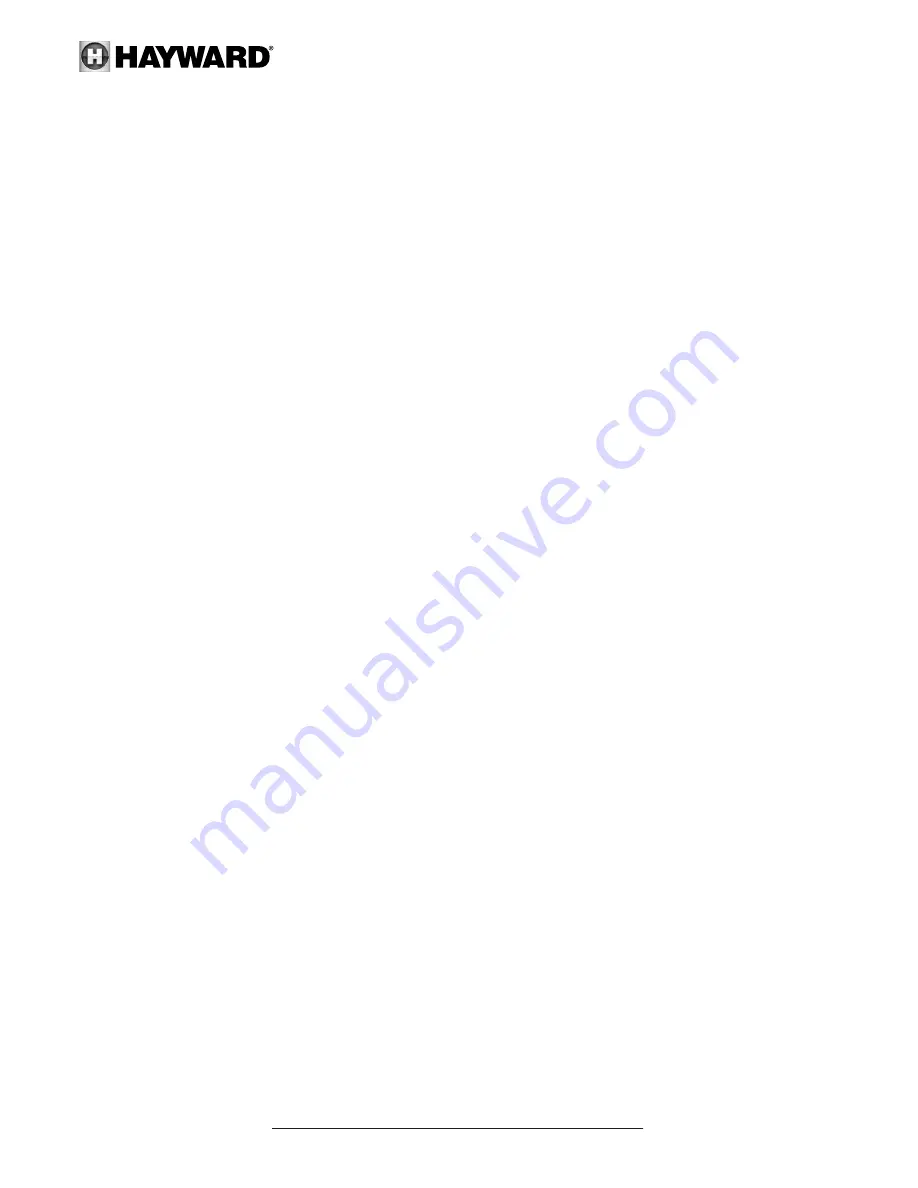
USE ONLY HAYWARD GENUINE REPLACEMENT PARTS
TriStar Variable Speed Pump
Page 13
Troubleshooting
Motor Will Not Start
1. Ensure the power cord is plugged in and the power is switched on. If the pump still won’t start check the availability
of power by plugging in another appliance and seeing if it will start.
2. If the pump is controlled via a Chlorinator or Total System Controller, ensure that the controlling device is actually
allowing the pump to start.
3. Check for open switches or relays, tripped circuit breakers or blown fuses.
4. Refer to an Authorised Service Agent or another qualified professional.
Motor Cuts Out
Your Hayward pump motor is equiped with
Automatic Thermal Overload Protection
. The motor will automaticly
shut-off before heat damage buildup can occur due to abnormal operating conditions. The motor will auto-restart when
a safe heat level is reached.
Pump Will Not Prime
1. Ensure that the length of time that the 3000 rpm priming cycle runs for is sufficient. This time is factory set to 2
minutes but can be adjusted up to 4 minutes (see page eight (8) for instructions how to change the length of time).
2. Make sure all the suction and discharge valves are open and unobstructed, that the filter manual air relief valve
is open, and that the pool water level is above all suction openings.
3. Make sure the pump strainer basket is clean.
4. Fill the pump strainer/housing with water to the level of the pump inlet. Ensure that the strainer cover o-ring is clean,
seated correctly, and lubricated. Tighten the strainer cover lockring by hand only.
5. Check for loose unions or damaged union o-rings on the suction side. Replace damaged o-rings and tighten the union
nuts by hand only
(no wrenches)
.
Low Flow - Generally
1. Check for clogged or restricted strainer basket or suction line. If the suction line is blocked contact a qualified repair
professional.
2. The pool piping is under size. Correct the piping size.
3. Check for a plugged or restricted discharge line of the filter, valve partially closed (high gauge reading). Sand filters -
backwash as per manufacturer’s instructions; D.E. filters - backwash as per manufacturer’s instructions; Cartridge
filters - clean or replace the cartridge as per the manufacturer’s instructions.
4. An air leak in the suction side plumbing (bubbles issuing from the return fittings). Re-tighten or re-seal threaded
suction fittings with Teflon tape. Inspect other plumbing fittings and replace o-rings and tighten as required.
5. Plugged, restricted, or damaged impeller. Replace the impeller including a new shaft seal assembly.
Noisy Pump
1. Cavitations caused by restricted or undersized suction line, an air leak at any joint, low water level in the pool, and
unrestricted discharge return lines. Correct the suction condition or throttle the return lines, if practical. Holding your
hand over the return fittings will sometimes prove this, or by putting in a smaller eyeball fitting.
2. Vibration due to improper mounting, ect. Mount the pump on a level surface and secure the pump to the equipment
pad.
3. Foreign matter in the pump housing or fan cowling. Loose stones/debris hitting the impeller or the motor colling fan
could be the cause. Clean the pump housing and the fan cowling.
4. Motor bearings noisy from normal wear, rust, overheating, or water ingress due to a worn or damaged shaft seal.
Contact a qualified repair professional to rectify.
30-LITINSB004 Rev-B


































